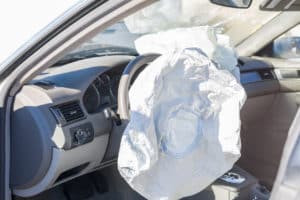Millions of vehicle owners are still waiting for automakers to provide replacements for their dangerous Takata airbags, as the National Highway Traffic Safety Administration (NHTSA) continues to urge automakers to speed up the process.
In the largest automotive recall in history, 19 automakers have so far recalled 37 million vehicles with 50 million Takata airbags that have been linked to 23 deaths and hundreds of injuries worldwide. The Takata airbags in question contain the chemical compound ammonium nitrate, which is used as a propellant that is housed in a canister in the steering wheel or behind the passenger dash, rapidly generating gas to inflate the airbag cushion during a crash. Ammonium nitrate is volatile and highly sensitive to moisture and heat which can cause the chemical to create too much pressure too quickly and rupture the metal canister, spewing metal fragments into the vehicle and occupants.
A November 2017 report from an independent monitor overseeing the Takata Coordinated Remedy Program found that although some vehicle manufacturers had dedicated significant resources to completing replacements, others had only just begun to exert effort. GM, for instance, is informing many customers its airbags are safe and don’t need replacing while it waits for NHTSA to determine whether to grant it an exemption from the recalls. Ford has filed repeated requests to extend the deadlines, asserting it has been unable to expeditiously test and procure airbag replacements that do not require ammonium nitrate propellant.
In May 2018, NHTSA told Reuters it had sent a letter to 12 major automakers, warning them that they had not met the December 2017 deadline for completing repairs in high-risk areas – such as Florida – that experience more humidity and heat fluctuations than other areas. The manufacturers included Honda, Toyota, General Motors, Fiat Chrysler, and Ford. The targeted automakers had collectively replaced 65 percent of the affected airbags, leaving about 7 million dangerous airbags on the road. NHTSA wanted to meet with each manufacturer to discuss the slow progress.
In July 2018, NHTSA followed up the letter with an announcement urging all automakers involved in the recalls to publicize on their websites their plans for replacing all defective airbags and be innovative in their efforts to reach owners. NHTSA Deputy Administrator Heidi King said, “To keep consumers safe in their cars and trucks, automakers should learn from their recall experiences to-date and from one another, and innovate broadly and creatively when crafting plans to better engage with consumers and communities to replace every last defective air bag in their vehicles.”
If you suspect that you or a loved one has been the victim of a defective airbag, call the Takata airbag recall lawsuit lawyers at Newsome Melton. We are standing by at 888-808-5977 to set up your free consultation.


